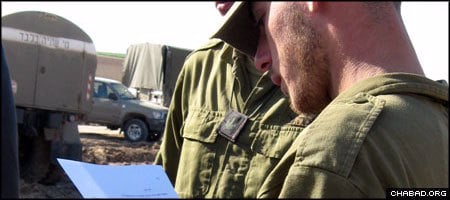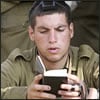For three hours on Wednesday, the guns went silent in the Gaza Strip. Ignoring military advice to the contrary, Israel momentarily halted its offensive against Hamas targets so that trucks could ferry humanitarian aid to civilians. Israel Defense Force soldiers rested a bit, grabbed a bite to eat, and mustered their strength for the battles ahead.
When they returned to the front, they carried with them letters written by people all over the world and hand-delivered by teams of Chabad-Lubavitch emissaries.
The letters, numbering in the thousands after just two days, have been collected by Chabad.org, and distributed by the Chabad-Lubavitch Youth Organization in Israel and its Chabad Terror Victims Project. For the past couple of days, rabbis and rabbinical students have been handing them out to soldiers and Israeli civilians living under the constant threat of rocket attacks, a sign of goodwill shown by foreigners to people on the front lines.
(To write a letter online, click here.)
“Dear soldier,” wrote one American high-school student. “The war you are fighting in the Holy Land has grabbed my full attention. I am standing behind you, and believe in what you are fighting for.
“You are my hero.”
For the soldiers who only speak Hebrew, the teams of volunteers – who also encourage the men to don tefillin and hand out care packages consisting of soft drinks, cookies, candy bars and pocketsize books of Psalms – translate the letters word for word.
“You could see their awe at the fact that there are people who don’t know them, but have such love and admiration for them just because they are defenders of the people,” said Rabbi Chuni Vogel, the Wilmington-based director of Chabad-Lubavitch of Delaware who traveled to IDF bases and staging areas around the Gaza Strip on Wednesday. “As we were leaving, giving them our heartfelt blessings that they should come back safely, they looked us directly in the eyes and, in solemn voices, said a loud and unified ‘Amen!’ ”
The letters frequently mention their author’s prayers. One Ohio woman told the soldiers: “Your deeds are not disregarded! Jews throughout the world are praying for you, for your family and for the safety of our beloved homeland.
“I am lifting you up in prayer to G‑d,” the woman continued, before paraphrasing a verse in Psalm 121. “G‑d, who will be your guardian, does not slumber, nor sleep.”
When the clock struck 4:00, said Rabbi Yossi Swerdlov, a Chabad-Lubavitch official in Jerusalem, the soldiers jumped into their jeeps and headed back to the front, their tires kicking up a trail of dust behind them. The men carried the letters into battle.
“These letters are filled with emotion and encouragement,” said Swerdlov, who since the beginning of Operation Cast Lead 13 days ago, has been visiting army bases and war-torn communities daily. “And they put these little missives of hope and love into their pockets.”

Sacrificing Everything
One of the first people to write a letter to the troops was Beverly Nerenberg, a resident of New York City who attends services at Chabad-Lubavitch of the Upper West Side.
“Shalom IDF soldier and your family,” wrote Nerenberg. “You and your parents, your sisters and brothers are very much in our family’s thoughts as each of you are defending the democratic way of life in the Middle East.
“May it come to be,” she continued, “that nations shall not lift up swords against another.”
Nerenberg explained that the pain of losing her brother to war spurred her to reach out to Israel’s soldiers.
“I remember my brother telling me how meaningful letters or care packages meant,” said Nerenberg, whose brother, 36-year-old U.S. Army Maj. Stuart Wolfer, died in an April 6, 2008, rocket attack in Iraq. “As a soldier, you sacrifice everything when you go off to war.
“When suddenly out of the blue, a letter arrives, it means everything to the soldier,” she added. “It brings normalcy into his or her life, if even for a moment.”
Yosef Lewis contributed to this story.








Join the Discussion